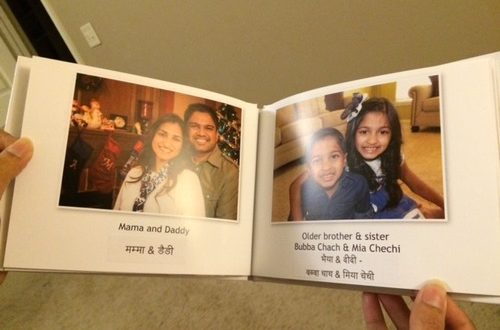We are celebrating our 11th wedding anniversary today. Yup! We are celebrating it by getting our baby girl – it’s definitely going to be the most memorable anniversary we’ve had. 🙂 We want to be careful on posting travel dates and such on social media but if you haven’t heard from us, just know that we’re so close to getting her. Yipee!!
Just this week, we’ve seen God’s favor and hand on so many things – craziness but so good! We finally got her passport copy, the Article 23 and guess what? My fingerprints passed!!! (That in itself is a miracle). And I want to be sure to give a shout out to our dentist (Dr. Swan) for donating toothbrushes and toothpaste for us to take as gifts to the orphanage. Now, the biggest hurdle is to wait for the background check to get to the U.S. Embassy in India, which could be just a few weeks away.
With travel plans underway, Alan and I think this is the best time to share some learnings about ‘bonding’ & ‘attachment’ in adoption. It’s basically how our child will connect with us as her family and vice versa. We’ve spoken to a few families and read many blogs/articles about it so we know what we’re about to share is pretty important. However, this is SO very new & difficult for us to talk about – only because it feels a bit unnatural so it can be tough for people to understand.
What is bonding and attachment in adoption?
To explain it better…even before birth, children are already attaching to their parents. So when the child comes out, he/she is familiar with their voices and from day one, they are held, comforted, fed, and cared for. It is very natural and they develop in all areas (including emotionally) the first year. So many things are hard-wired the first year! For adopted children- they generally miss out on the constant touch, affection, interactions and so forth that they may attach themselves to a caretaker OR they never learn to attach to anyone if they’ve been moved around so much or have had several guardians in their life. I may not be the best to explain all this but I hope it makes some sense.
Everyone has good intentions so we hope that this blog post will be helpful to you as you help our baby girl integrate into our family and into her new community. We want to lay the foundation for her of what and how a family is. If we didn’t talk about this, we believe we would be failing as her parents because we wouldn’t be thinking about what is best for her. Some of this may only make sense as she grows up but here goes….
She may not necessarily be grateful to have been adopted & she won’t know what to say if she’s asked whether she likes us. WHAT? 😉
I know people say that she’s lucky but chances are she may not feel like it. Maybe, just maybe she may come to that conclusion when she’s an adult and maybe not. We don’t expect her to feel that way so it’s okay. Children are created with the need for love. “When we provide it we are not heroes, we are simply meeting one of their very basic needs. Expecting adopted children to be grateful for being adopted is like expecting our biological children to be grateful for being conceived. It was a choice that we, her parents, made and that they were brought into. She didn’t get a choice as to whether she wanted to come join our family or not.”
Please don’t feed her.
Before she learns to love her extended family and friends, she needs to learn how to love her parents and siblings. Since we were not there to meet her early needs (breast or bottle feeding, comforting them when they were sick, changing diapers, etc.), we need to make up for it by meeting as many of their physical and emotional needs as possible now. Some children also have food insecurities and they tie love to being fed so these are all phases we want to be prepared for.
Choosing words & questions carefully is important – especially in front of our kids.
All three are our “real” kids and, in most situations, you can refer to them by their name – not how they were joined to the family.
We understand that it is normal to be curious and to wonder about the circumstances that led to her adoption but forgive us if we don’t go into detail about her personal story. She may or may not choose to divulge more of her story someday when she is older but it’s her story to tell -not ours.
She may need to be parented differently than her siblings.
We don’t plan on spoiling her (well, maybe a little. Ha!). But we definitely won’t make any excuses for poor behavior. Babies and toddlers may not know what they’re feeling but adopted children have all experienced loss and even possibly trauma. This just means that we’ll have to use techniques that work for her needs – which may look completely different from what works with her siblings. Examples would be: If she has a fear of abandonment, we won’t do ‘time-outs’ and make her feel all alone. She’ll also be in the process of ‘attaching’ with us so we would do more harm than good. Taking things from her may not work if she doesn’t have the same value of having her own possessions. You get the picture….
If you would like to give a gift to the baby, please consider something small that the whole family can enjoy together.
A few ideas are a frozen meal, a gift card, toys or activity supplies for all of the kids to share. Gifts can be overwhelming for children who have had few material possessions. Also, we want her to learn to love people for who they are, not for the fact that they hope they’ll get another gift the next time someone comes around. In addition to that, we don’t want her siblings to feel left out, experience jealousy or any resentment. We appreciate all of the love and support that we were shown during our adoption process and we know that everyone is excited to meet her but taking photos of just her or pouring attention on her while ignoring Mikayla & Levi is not healthy for our family.
Attachment takes time and work.
It doesn’t happen overnight. Even if it appears that our child is securely attached to us, it may take a few months for our family to bond. Even though we love her in our hearts – we’re strangers to her and she to us so it will take time to get to know each other. We’re definitely going to be realistic and not expect our family to be perfect once she’s home. We may face challenges when it comes to age, family dynamics, emotional, physical or developmental delays.
As a result, our agency has asked us to limit visitors at the beginning. We also may discourage physical contact with her for a period of time. We discourage anyone from holding or hugging her but high-fives & patting are welcome. “Many children who have lived in orphanages and institutions learn to fight for adult attention. Often they can put on quite the show and act like the most friendly, charming child to draw attention to themselves.” It gives people the false impression that they are well-adjusted so it’s important that initially, the parents are the only adults who help fulfill these children’s need for physical affection. This also teaches healthy boundaries and is a safety consideration since no child should feel obligated to have close physical contact with someone that they do not know well. To her, everyone is a stranger – even her family.
Please refrain from commenting on her appearance- especially in front of her.
She will obviously want to be included and fit in. This may be my first public mention of it but she has a condition called ‘microtia’ along with a bit of paralysis on one side of the face. We knew those details as soon as we were matched with her but after speaking to our pediatrician and our family, we didn’t see why we wouldn’t adopt her. She’s developing perfectly for her age and is healthy as can be. Know that her challenges or imperfections don’t define her in any way. 🙂 Since it has to do with her face, it will be obvious what her ‘special need’ is but we don’t ever want her to feel self-conscious or ashamed of it. As she grows older, we will look into possible procedures that may be of help to her.
We won’t be advertising the cost of her adoption.
If you would like to know how much our adoption process was, please ask when our children are not present or just read this blog! We would be more than happy to share our experiences and to provide helpful information but we don’t ever want her to feel like she was ‘bought’.
I know we just threw a ton of info out (most of which was inspired by the second blog post listed below), but thank you for taking the time to read it. If you’re interested in knowing more about how to support adoptive families, here are some good reads:
(Lil George Fund: http://www.gofundme.com/3h66b4g4)






